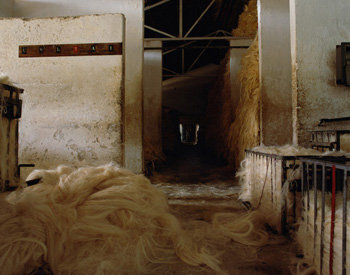El Anatsui
Zarina Bhimji
Antonio Ole
Yinka Shonibare
Pascale Marthine Tayou
Udo Kittelmann
Chika Okeke-Agulu
Britta Schmitz
2/6/2010
Who Knows Tomorrow
Different venues, Berlin
The National Gallery has invited five artists, whose work is primarily shaped by their African origins, to join together in creating a major exhibition in Berlin. Artists' works, completed and installed in prominent positions outside four of the National Gallery's separate venues - Old National Gallery, New National Gallery, Friedrichswerder Church, Hamburger Bahnhof - will together serve to spark a dialogue over questions that are now more topical than ever before, thanks to the radical upheavals currently sweeping political, social and economic systems that had, until now, been considered unshakeable.

curated by Udo Kittelmann, Nationalgalerie – Staatliche Museen zu Berlin;
Chika Okeke-Agulu, Princeton University/NJ;
Britta Schmitz, Nationalgalerie – Staatliche Museen zu Berlin.
Artists: El Anatsui, Zarina Bhimji, António Ole, Yinka Shonibare, Pascale Marthine Tayou
Who Knows Tomorrow - this piece of worldly wisdom, heard everyday over large parts of Africa, provides the title for a remarkable project held by the National Gallery, for which it has invited five internationally acclaimed artists, whose work is primarily shaped by their African origins, to join together in creating a major exhibition in Berlin.
Their works, completed and installed, for the most part, in prominent positions outside four of the National Gallery's separate venues (Old National Gallery: El Anatsui, New National Gallery: Pascale Marthine Tayou, Friedrichswerder Church: Yinka Shonibare MBE, Hamburger Bahnhof: Zarina Bhimji, António Ole), will together serve to spark a dialogue over questions that are now more topical than ever before, thanks to the radical upheavals currently sweeping political, social and economic systems that had, until now, been considered unshakeable. These questions include: is uncertainty over the future now the greatest certainty we have today? Whose history needs to be told and faced up to now? What is art's contribution to helping overcome (art) historical constructs, clichés and stereotypes?
Who Knows Tomorrow eschews the common practice of presenting artists in group exhibitions as representatives to speak for an entire continent. Instead, the participating artists reflect and interpret our own history and present us with their views of our culture, against the back-drop of four of the National Gallery's iconic buildings, which themselves reflect German national identity at various points in the country's past. The artists' works bear the signs of historical complexities and ties between Africa and Europe and deal with aspects of the search for identity and globalisation, both of which have currently become extremely topical once again. In the process, a clear link is established between the history of Africa's colonisation and the situation in 19th century Berlin, then capital of the German Empire. While the question of national identity, so fiercely debated in and around Europe during this period, was hardly raised at all in colonised Africa at the time, it has now undergone a dramatic shift in today's world.
The artists involved in the Who Knows Tomorrow exhibition frequently lay bare forgotten and overlooked cross-ties between Africa and Europe, as well as those that are being formed as we speak. Despite the fact that their works bear witness to a process of intercultural fusion, in which overlapping and mergence become a conceptual stylistic medium, a method, it would be wrong to assume that they merely reflect their own aesthetic history. They amount instead to an analysis of the history of art from a social perspective, over many epochs and cultures. By calling for the salvation of memory and making diversity into a prin-ciple, their works challenge us, their audience in the Western world, to reflect critically on ourselves and realign our relation to them.
The exhibition, which comes under the auspices of the German Federal President, Horst Köhler, is accompanied by an extensive programme of events and a reader packed with insight from a multitude of perspectives.
Presse
Anne Schäfer-Junker
presse@smb.spk-berlin.de
Fon +49 (0)30 266 42 3402
Fax +49 (0)30 266 42 3409
Image: Zarina Bhimji, Clogging my mouth (TurnerPrize 2007), 2007
© Courtesy die Künstlerin
Press conference: Wed, June 2, 2010, 11 a.m.
Location: Friedrichswerdersche Kirche, Werderscher Markt, 10178 Berlin-Mitte
Opening: Thu, June 3, 2010, 6 p.m.
Location: Neue Nationalgalerie, Potsdamer Straße, 10785 Berlin-Tiergarten
Exhibition venues
Alte Nationalgalerie, Friedrichswerdersche Kirche, Neue Nationalgalerie, Hamburger Bahnhof - Berlin
Opening hours
Alte Nationalgalerie: Tue-Sun 10a.m.-6 p.m., Thu 10a.m.-10 p.m.;
Friedrichswerdersche Kirche: Mon-Sun 10a.m.-6 p.m.;
Neue Nationalgalerie: Tue, Wed + Fri 10a.m.-6 p.m., Thu 10a.m.-10 p.m., Sat +Sun 11a.m.-6 p.m.;
Hamburger Bahnhof – Museum für Gegenwart: Mon-Fri 10a.m.-6 p.m., Sat 11a.m.-8 p.m., Sun 11a.m.-6 p.m.
The works in front of the Alte Nationalgalerie, the Neue Nationalgalerie and the Hamburger Bahnhof can also be viewed outside the opening hours.



